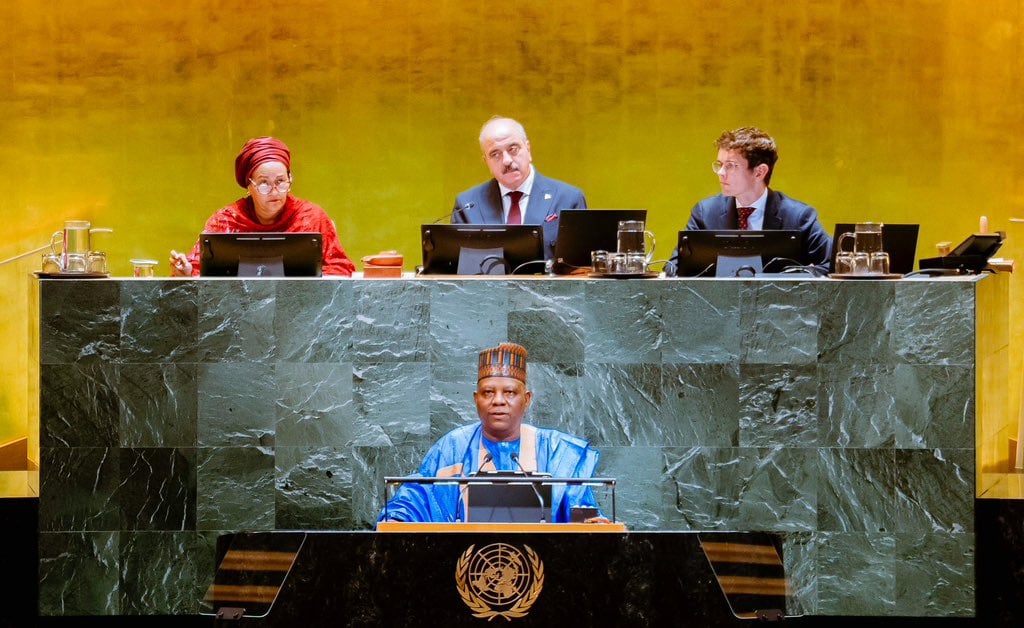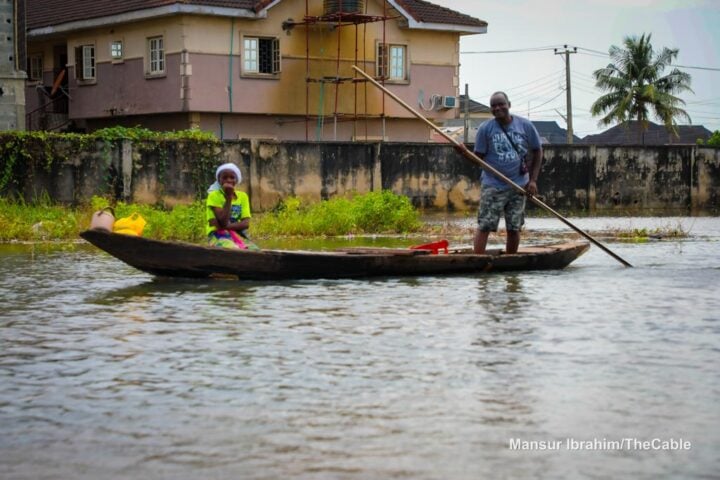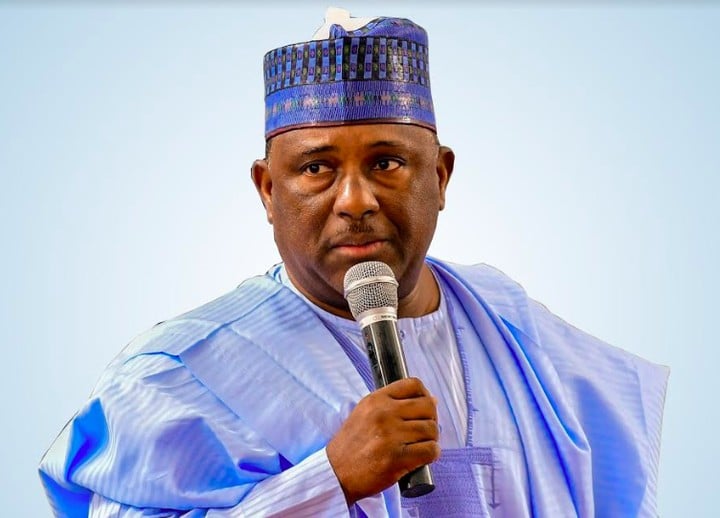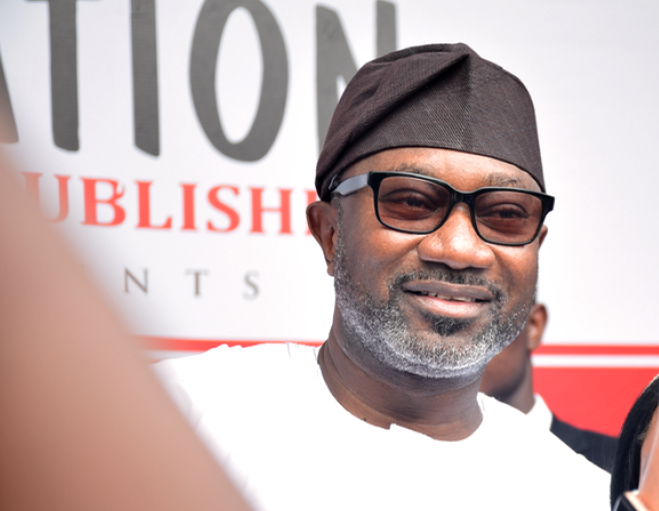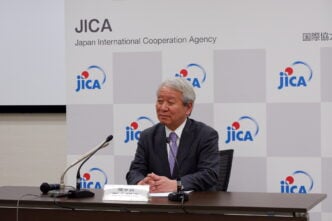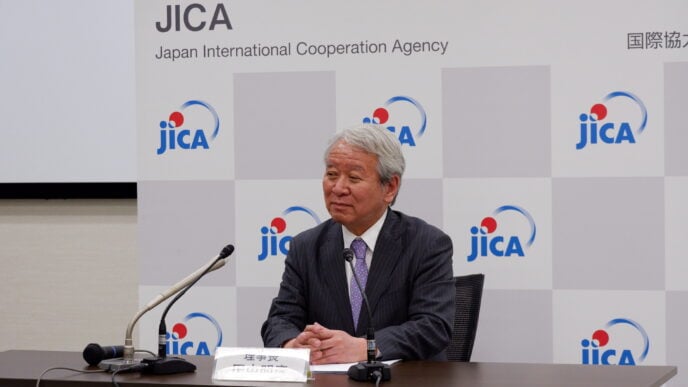Vice-President Kashim Shettima presents Nigeria's statement at UNGA80
Nigeria headed into the 80th session of the United Nations General Assembly (UNGA) with an ambitious agenda.
Vice-President Kashim Shettima, who spoke on the country’s behalf, outlined demands that touch on everything from global governance to economic opportunity.
Shettima spoke late Wednesday at the UNGA’s general debate.
TheCable had reported, ahead of the debate, that Nigeria would press for representation in the UN security council, global finance architecture changes, and address the Palestinian statehood debate.
Advertisement
Shettima pushed for those reforms, saying they are vital to Africa’s future and the balance of international order.
Here are key takeaways from his speech.
DEMAND FOR UN COUNCIL SEAT
Advertisement
Shettima began his speech by frowning at the “slow pace of progress” at the UN.
He noted that the “troubling signs” had forced nations to dismiss the fairness of the multilateral institution and charged the global body to make changes that work.
One of the changes, Shettima argued, is Nigeria’s permanent representation at the UN security council.
“A stabilising force in regional security and a consistent partner in global peacekeeping, our case for permanent seat at the Security Council is a demand for fairness, for representation, and for reform that restores credibility to the very institution upon which the hope of multilateralism rests,” the vice-president said.
Advertisement
Shettima listed Nigeria’s involvement in 51 out of 60 UN peacekeeping missions, the regional Multinational Joint Task Force (MJTF), and condemnation for global aggressors to back up his point.
“We are despised by terrorists because we choose tolerance over tyranny. Their ambition is to divide us and to poison our humanity with a toxic rhetoric of hate,” he added.
“We do not only fight wars, we feed and shelter the innocent victims of war.”
Shettima also noted Nigeria’s commitment to democracy and its regional partnership with the UN in this regard.
Advertisement
ESTABLISHMENT OF GLOBAL FINANCE COURT
The second demand was a call for measures that would oversee the restructuring of the global finance architecture.
Advertisement
Shettima said the increasingly difficult security outlook in the world has prompted many countries to count the cost of the emerging world order.
“We in Nigeria are already familiar with such difficult choices: infrastructure renewal or defence platforms? schools or tanks?” he said.
Advertisement
He noted that the country has taken “difficult but necessary steps” to restructure the economy and charged the UN to take a similar route.
“We can take that progress to the next level, a level that presents new opportunities for trade, investment and profit, if we can access reforms to strengthen the international financial architecture,” he added.
Advertisement
“We need urgent action to promote debt relief — not as an act of charity but as a clear path to the peace and prosperity that benefits us all.”
To achieve the reforms, Shettima called for “new and binding mechanism to manage sovereign debt, a sort of International Court of Justice for money, that will allow emerging economies to escape the economic straitjacket of primary production of unprocessed exports”.
FAIRNESS IN MINERAL MINING
Shettima criticised exploitative mining on the continent, saying they leave African nations impoverished.
The vice-president agreed that international investments offer a way out of decay but noted that African countries must also benefit from the process.
“We know in Nigeria, that we are more stable when those communities that have access to key resources are able to benefit from those resources. This has been our journey in the oil producing region of the Niger Delta,” he said.
“I believe that we will strengthen the international order, when those countries that produce strategic minerals benefit fairly from those minerals — in terms of investment, partnership, local processing and jobs.
“When we export raw materials, as we have been doing, tension, inequality and instability fester.”
BRIDGING THE DIGITAL DIVIDE
Shettima also made the case for Africa’s inclusion in technological advancements to bridge the digital divide through the creation of a “dedicated initiative” that would bring researchers, private sector, governments and communities together.
“As we stand on the threshold of new and dramatic technological change, we are still absorbing the impact of the revolution in information and communication of the past 20 years,” he said.
“We understand better than we did, the opportunities technology offers as well as the safeguards we need to enable growth and mitigate the potential for corrosion. Some worry about fake news. We have plenty of that, with the potential of devastating real-world consequences in countries rich and poor.
“I am more worried about an emerging generation that grows ever more cynical, because it believes nothing and trusts less.
“As technology shakes up public administration, law, finance, conflict and so much of the human condition, I am calling for a new dialogue, to ensure we promote the best of the opportunities that are arising — and promote the level of access that allows emerging economies more quickly, to close a wealth and knowledge gap that is in no one’s interest.”
CONDEMNATION OF ISRAEL, SUPPORT FOR PALESTINE
Nigeria has long recognised Palestine as a state since 1988. But at UNGA, Shettima joined the clarion call for a two-state solution.
He condemned Israel’s war in Gaza, saying the tensions scar the wider region.
“We do not believe that the sanctity of human life should be trapped in the corridors of endless debate. That is why we say, without stuttering and without doubt, that a two-state solution remains the most dignified path to lasting peace for the people of Palestine,” he said.
“The people of Palestine are not collateral damage in a civilisation searching for order. They are human beings, equal in worth, entitled to the same freedoms and dignities that the rest of us take for granted.”
He said Nigeria’s stance is non-partisan, emphasising the country’s role as a peacemaker.
CLIMATE CHANGE NOT AN ABSTRACT ISSUE
Shettima took a different position from US President Donald Trump who called climate change the “greatest con job” of all time.
The vice-president asked the UN to re-examine the best use of its scarce resources by addressing climate change.
“It is not an abstract issue about an indeterminate fate, to be settled at some distant point in the future,” he said.
“It is not even solely an environmental issue. It is about national, regional, and international security. It is about irregular migration.
“Truly, this is an ‘everyone issue’. We are all stakeholders, and we are all beneficiaries of the best outcome.”
Shettima closed his 20-minute speech by asserting Nigeria’s commitment to peace, development, unity, multilateralism, and human rights.
